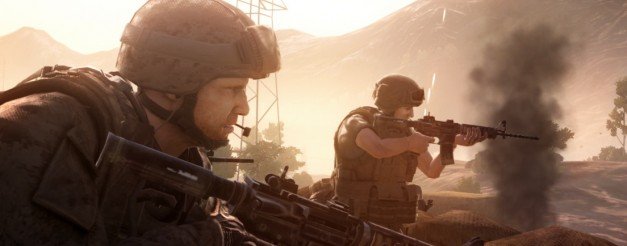
Earlier this month we reported on some controversial quotes from an interview with Sion Lenton, creative director on Operation Flashpoint: Red River. He spoke to PC Gamer about the current state of PC gaming, the importance of realism, and the new direction that Codemasters are taking the franchise.
We are now able to post the entire transcript for your reading pleasure.
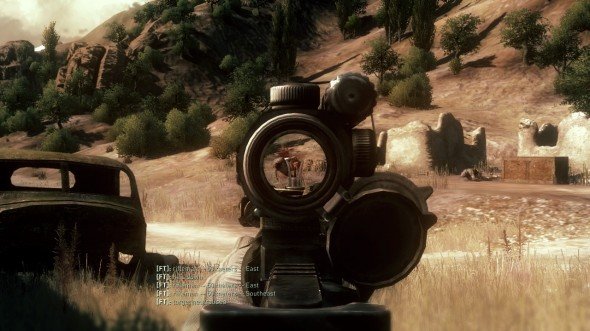
PC Gamer: With a lack of competitive multiplayer, how are you going to make sure that Operation Flashpoint: Red River stays fresh to play?
Sion Lenton: I think really I counter that by saying it's online play that provides staying power. The distinction between competitive and coop is a fine one to make, but if you look at games like Left 4 Dead and Borderlands; even things like Counterstrike, I think coop has its place, and I also don't think that utilised enough, really. I very rarely play competitive games. I can't be arsed dealing with some kid on the other end swearing at me. I want to be playing with my mates.
It's going to take off, I'm really confident that what we've got works as a product. The coop, the fire teams, the skills and so on. I don't notice it's missing, I don't feel like it's missing. And to be pragmatic, in order to be competitive in that area, it's a lot of work, because, you'd argue that games like that have got it nailed. Cooperative is great because it puts us in a different place, which is always a good place to be, and I see it coming on leaps and bounds in the future.
PC Gamer: With a cooperative game, the longevity of the game often relies more on the volume of content available. Are there any plans for mod support?
Sion Lenton: Not at the moment, no. We actually went back to basics on a lot of our tools and tech, because there were several things we wanted to include. We wanted terrain manipulation into the tools, and actually making that into a public-facing tool was not something that we had scheduled in. It's not something we're ruling out, but we're playing a longer game here, as it were. We want to go on record and say that Flashpoint is every two years, and now that we know that, we can build in a longer term plan.
Keep up to date with the most important stories and the best deals, as picked by the PC Gamer team.
I hate to use the word 'reboot', because I think it's a bit of a cliche, but it is kind of a reboot, it's kind of similar to what did going Colin McCrae to DiRT, Toca to GRiD. It's a change, a modernisation, and the bottom line is, we wanted to start on an even platform on all platforms, so you get the same flavour of game on every platform. That's not to say the future won't be different, but for where we are now, that seems the most appropriate way to go.
PC Gamer: With that in mind, do you have plans to release your own missions and scenarios?
Sion Lenton: There's going to be a press announcement about DLC in the next month or two, I'd imagine.
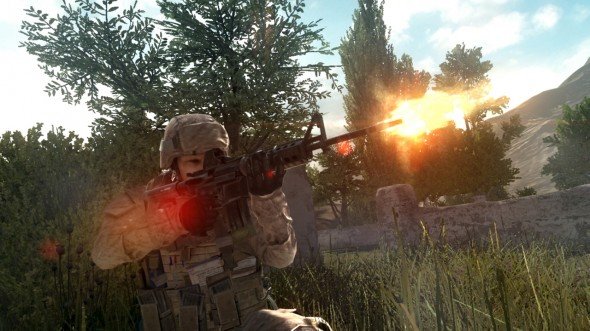
PC Gamer: There's quite a hefty difference between the original Operation Flashpoint and Red River. Was that an active decision to move away from the simulation roots?
Sion Lenton: Absolutely. There are a couple of reasons for that. One thing of course is that the heritage of the franchise is PC. And, as great as PCs are, from a sales point of view, it's not the market, there's a bigger market out there, and if you get success, you can start to experiment more. You need to get the sales under your belt, and then that gives you the freedom to do other things, so again, that ties into the idea of the reboot of it.
Really, we want to steer away from any talk of it being a simulation. We've almost banned the word in the studio. Authentic is fine, because it gives you a bit of creative leeway in the studio, and that's what we are, we're creative. We're making an entertainment product, and it should be fun, and I really don't get much fun out of military simulations. They're engaging, they're immersive, but I wouldn't call them fun.
I know we get a lot of people going 'Oh, this is what I want, this is the kind of game I want to play', but, to be honest, it's out there. There's ArmA, play it. There you go. And they do a great job on that, and best of luck to them. We want to do something different, and we don't want the name, the brand, the franchise, to be tied down to that kind of thing. From where I am, at the minute, there's no reason that we can't do an RTS Operation Flashpoint game.
What we've done is elevate it from a single game to more of a DNA, rather than a feature set. So things like authenticity, global superpowers, future fiction; it's enough to give us a bit of leeway with an Operation Flashpoint game, but it also allows us to do something different. You've got to keep moving; you can't just do the same thing again and again and again. That would bore you silly, that's not why I'm in the business of making games. I want to innovate, I want to do things that are new. Sometimes that means hitting the reset button, sometimes that means changing course and doing something different with it. At the end of the day, people vote with their wallets, and if they don't like what we're doing, I'm sure they'll let us know.
I'm actually really confident that we've got something that's going to be really successful, and it's going to be really successful because it's something different to what else is out there, certainly from a console point of view. I sense a bit of genre fatigue with the big shooters that are out there at the moment, I don't think it's going to end tomorrow or anything, but I do think people are yearning for something deeper, something a little bit more immersive, something a little bit more challenging, and if we can supply that sort of experience, and then build on it in the future, I'd be delighted with that.
PC Gamer: With a game so based around Coop, are going you to be using some proprietary software like Steamworks or Games for Windows Live?
Sion Lenton: Games for Windows Live.
PC Gamer: Ah, ok. Well, one of the things that personally really annoys me in some multiplayer games is that they'll have unlocks, but they'll be vertical upgrades, outright replacing the first guns you get, and giving an big advantage to existing players. Being coop, is that something you've been able to sidestep by not pitting players against one another?
Sion Lenton: So what we've really tried to do with the guns, and one of the things I'm really proud about Red River, is that we've got a really great behind-the-gun experience, really solid. You've played it yourself, it's solid, it really is. But also, there's handling. Like on the cars in DiRT or GRiD, they're different, and they handle differently. I love the idea that you'll be able to master the weapon, yourself, not by modifying it or unlocking attachments, but by learning it, learning the recoil, and what the actual bullet damage is like on that gun. Obviously things like scopes and sights give advantages, and we've also got the B-Mods and Specialisations, which I guess are about as near as we've got to that kind of thing, but they're tuned to the classes, and giving them benefits, rather than competitive benefits. It's a cooperative benefit, a teamwork benefit.
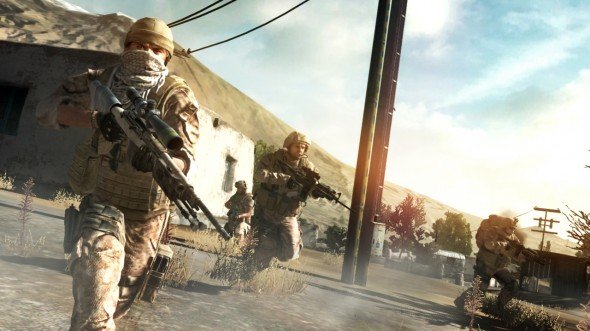
PC Gamer: With coop games especially, it's often very difficult to play with strangers, because you've got to be so in sync with one another. How have you made the experience more streamlined?
Sion Lenton: One of the cool things that we've got, as you saw on the command radial, where you give orders to your AI guys, but it's also how you give orders to humans on the team as well. The great thing about that is that if you're playing with someone in Germany, your orders are translated to German. The really great thing we've got, though, is that the clients, (the host is the fire team leader), the clients all have their own quick command radial as well. It's responses as opposed to orders. 'I'm pinned', 'I need help', 'Corpsman!'. You can even paint a location, to tell your team that you've seen someone, and then put a marker in the world so they know where.
But at the end of the day, because of the way the game plays, you can't just jump in and be successful, you have to work as a team, like with anything, and if it encourages teamwork, that's great, and we try to break down those language barriers with the quick command radial, but, and it's kind of a weird thing to say, but it's not really up to us. We're giving you the tools to play this game, we're giving you the environment to play this game, but there's not reason people who haven't met before shouldn't be able to play and get a really great experience out of it.
PC Gamer: Well one of the things you mentioned earlier was Left 4 Dead, where there's automated voice commands to make it easier to understand what's going on. So 'Pills here!', 'Reloading!' and the like. Is that something you've got in game?
Sion Lenton: That's actually where we got the idea for translating the commands so people can play with people in other countries. I was playing Left 4 Dead with a French player, and I suddenly realised that they were getting the French version of 'Ammo here!', and I thought that was really cool. So for an authentic, US-army based military shooter, you'd be surprised how much Left 4 Dead and Borderlands actually inspired us from a gameplay point of view. 'Cause it's fun. We've got points in there, scores in there, because they're fun. Those games were the big ones for us.
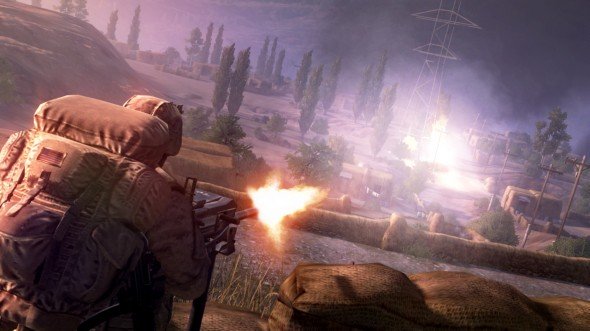
PC Gamer: In the last few weeks, there's been a lot of activity in the Middle East, with protests in Libya and Bahrain. Has that made you anxious at all about placing your game so close to real world events and places?
Sion Lenton: No. I don't think that the Middle East influence, as politically charged as it is, I don't think it affects our world. What was interesting, and probably went under the radar, was the announcement that China is now the world's second largest economy, and that's actually much more interesting to me, because that's in line with what we're predicting with the game. People constantly ask why we keep on using the Chinese, why we keep using the PLA, and well, if you can come up with a better superpower in the world today, then go for it. But they are, they're absolutely massive. Biggest army in the world, second biggest economy. Japan is the only economy larger than them now, and China is bailing the US out now left right and center with loans.
I think it's interesting, but again, I think we chose well. There has been some news coming out of Tajikistan that has been bouncing over to us, where twenty four insurgents escaped from a prison and went on a rampage, stuff like this, and that's kind of telling. The ECIN, mentioned in the game, that's a real group, and for better or worse, we're predicting that they're going to get more hard core, and more well known in the next few years. But, as much as that stuff is going on, I don't think it really effects our world, that Flashpoint world.
PC Gamer: You've got a limited number of Coop missions in the game. How are you going to keep them fresh to play every time?
Sion Lenton: Ok, so there's a few ways with which we do that. First off you've got the classes, where you can play as a Scout, play as a Grenadier, and as you're playing through, in any game mode, be it campaign, or one of the stand alone missions, you're earning XP, which you can spend to improve your class. So whatever you play, you're improving. So you've got progression through those character types.
The other really cool thing that we've got is that the games are literally different every time. So, take Combat Search and Rescue. First time, the pilots are there, the helicopter is there, you go in, you get them out (if you're lucky, because it's a hard mission), and then you play it again, but wait a minute, the pilots aren't there, the pilots are in a different place. So while it's not random, we have several areas where things can be set up. Another great example is in Mission 4, where you have to go up a narrow ravine, and again, the placement is randomised, it's different every time. So from a replay standpoint, you walk in and suddenly something isn't where you expected, and your gameplan has gone out of the window. They're not here; they were here yesterday, but they're not here today.
And that's not just the placement; it's also down to how our AI works. It's not scripted, whack-a-mole AI, it's much more autonomous. I've described them before as much more improv actors. They know what the scene is, they know they need to get from A to B, but when we say Action!, they have to react to what's going on. So because we're in an open world, and you come down the middle, they'll try to flank you or get around you. Then if you go down the side, they've got to be able to react to that appropriately. So that randomisation, the class progression, and also just feeding back from what the player does. So if you play the game differently, the AI will react to the game differently. And that's in the campaign, that's in the stand alone missions, that's everywhere.

